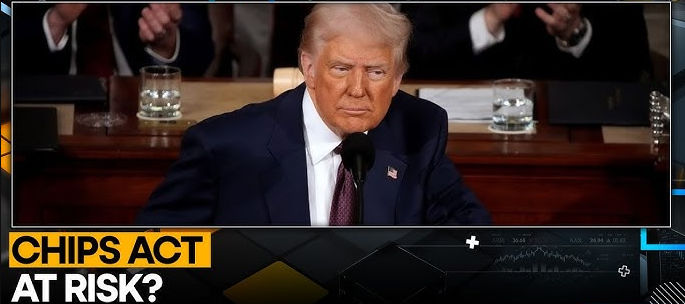
The bipartisan CHIPS Act played a pivotal role in Intel’s decision to invest billions in Ohio, laying the groundwork for a massive semiconductor manufacturing plant. However, President Donald Trump recently called for its repeal, igniting concern among Ohio officials and business leaders who worked to bring Intel to the state. While a repeal would require sufficient votes in both chambers of Congress, the question remains: Is there enough support to overturn the legislation?
Among Ohio’s congressional delegation, U.S. Senator Jon Husted was the only lawmaker to express unequivocal support for the CHIPS Act.
For more context on the current standing regarding the Ohio chipmaking plant, you can find our recent article, here: Intel Faces Fresh Scrutiny Over Delays to Ohio Chipmaking Plant.
Trump’s Talking Points Sparks Debate
“This was going to be the Silicon Heartland,” said Mike Knisley of the Ohio State Building and Construction Trades Council. “This will be a huge setback for Ohio. It’s just so disappointing, on so many different levels, [like] from a standpoint of national defense.”
Knisley, who has worked closely with Intel and lawmakers to advance the CHIPS Act, reacted strongly to Trump’s remarks. “Your CHIPS Act is a horrible, horrible thing,” Trump declared during a congressional speech, claiming that companies were failing to spend the allocated funds efficiently. He suggested the remaining funds be redirected to reducing national debt. “They will come because they won’t have to pay tariffs if they build in America,” Trump argued.
Knisley did not mince words in his response. “Grandpa’s lost his mind,” he added, stating that he stood by his frankness. “At the end of the day, whose side are you really on here?”
State Senator Bill DeMora (D-Columbus), a longtime skeptic of Intel’s timeline, voiced his concerns. “Are we ever going to see Intel built?” he asked. “Millions and millions and hundreds of millions of dollars, and we might get nothing but a white elephant with holes in the ground.”
With Ohio already committing billions in subsidies, Knisley emphasized the broader impact, pointing out that unions, colleges, and local governments—especially Columbus—have been working to support the project’s success. “I think it says to the taxpayer that you don’t matter,” he added.
Republican Lawmakers Weigh In
Senate President Rob McColley (R-Napoleon) acknowledged delays in CHIPS Act funding under the Biden administration. “The CHIPS Act funding should have been out a while ago,” he said. He suggested Trump favored tariffs over direct subsidies as a means of economic development. When asked about a potential repeal, McColley was noncommittal. “I think our delegation is paying attention to see where this thing goes, and we’ll see where it ends up.”
House Speaker Matt Huffman (R-Lima) questioned whether a repeal would truly derail the project. “I find it hard to believe that the money is just going to get pulled and somehow would imperil the project,” he said. While expressing support for Intel’s expansion, Huffman remained uncertain about whether the company would back out. “I don’t think they’re going to walk away from the $2.3 billion they’ve already spent.”
Senate Finance Chair Jerry Cirino (R-Kirtland) speculated that Trump’s stance might not mean a complete repeal. “It might not be a wholesale elimination of it, maybe downgrading it a bit,” he suggested, while reaffirming his belief that Intel would continue with its Ohio plans. “There are so many other good reasons to come to Ohio, and they decided to come here before the CHIPS Act was even enacted.”
Governor Mike DeWine’s administration remains confident in Intel’s commitment. “When Intel announced the New Albany project, they committed to it whether the CHIPS Act was passed or not,” said DeWine spokesperson Dan Tierney. “The company remains committed to onshoring its manufacturing, which aligns with President Trump’s semiconductor strategy and onshoring strategy.”
Knisley remains skeptical. “Right out of the gate, CHIPS was part of this whole equation,” he said, recalling how Intel delayed its groundbreaking ceremony pending the bill’s passage.
Congressional Responses
Reporters reached out to Ohio’s Republican congressional members, but none directly stated how they would vote on a repeal effort.
U.S. Senator Jon Husted underscored the bill’s importance. “The CHIPS Act was a major bipartisan piece of legislation to pass recently, and I am confident bipartisan support remains. For the economic and national security of America, we need to make chips in the USA—I believe this is part of an America First agenda. Making chips in places like Ohio will make sure that China doesn’t win.”
Other Ohio Republicans criticized the Biden administration’s handling of the CHIPS Act but stopped short of endorsing its repeal. Congressman Dave Joyce (OH-14) emphasized national security concerns. “Domestic semiconductor manufacturing and research allows the United States to be independent from our adversaries, and Intel’s Ohio One project is designed to help us do just that.” However, he accused the administration of failing to implement the program efficiently.
Congressman Michael Rulli (OH-06) expressed support for domestic chip production while voicing concerns over federal regulations. “While the Biden approach mandated DEI hiring and other woke giveaways, President Trump’s economic agenda will invigorate American industry without the endless red tape.”
Congressman Troy Balderson (OH-12) echoed Intel’s initial commitment to Ohio. “The Ohio One project promised to be full speed ahead, regardless of supplemental federal funding—while passage of the CHIPS Act would allow Intel to ‘go faster and further.’ Unfortunately, the Biden Administration completely botched the rollout.”
Congressman Dave Taylor (OH-02) declined to comment, while several other Republican lawmakers, including Senator Bernie Moreno and U.S. Reps. Jim Jordan, Bob Latta, Max Miller, Warren Davidson, Mike Turner, and Mike Carey, did not respond.
As uncertainty looms over the future of the CHIPS Act, Knisley issued a challenge to stakeholders at all levels. “I think it’s now a time for everyone—corporations, politicians, everyday Americans—to show some spine.”